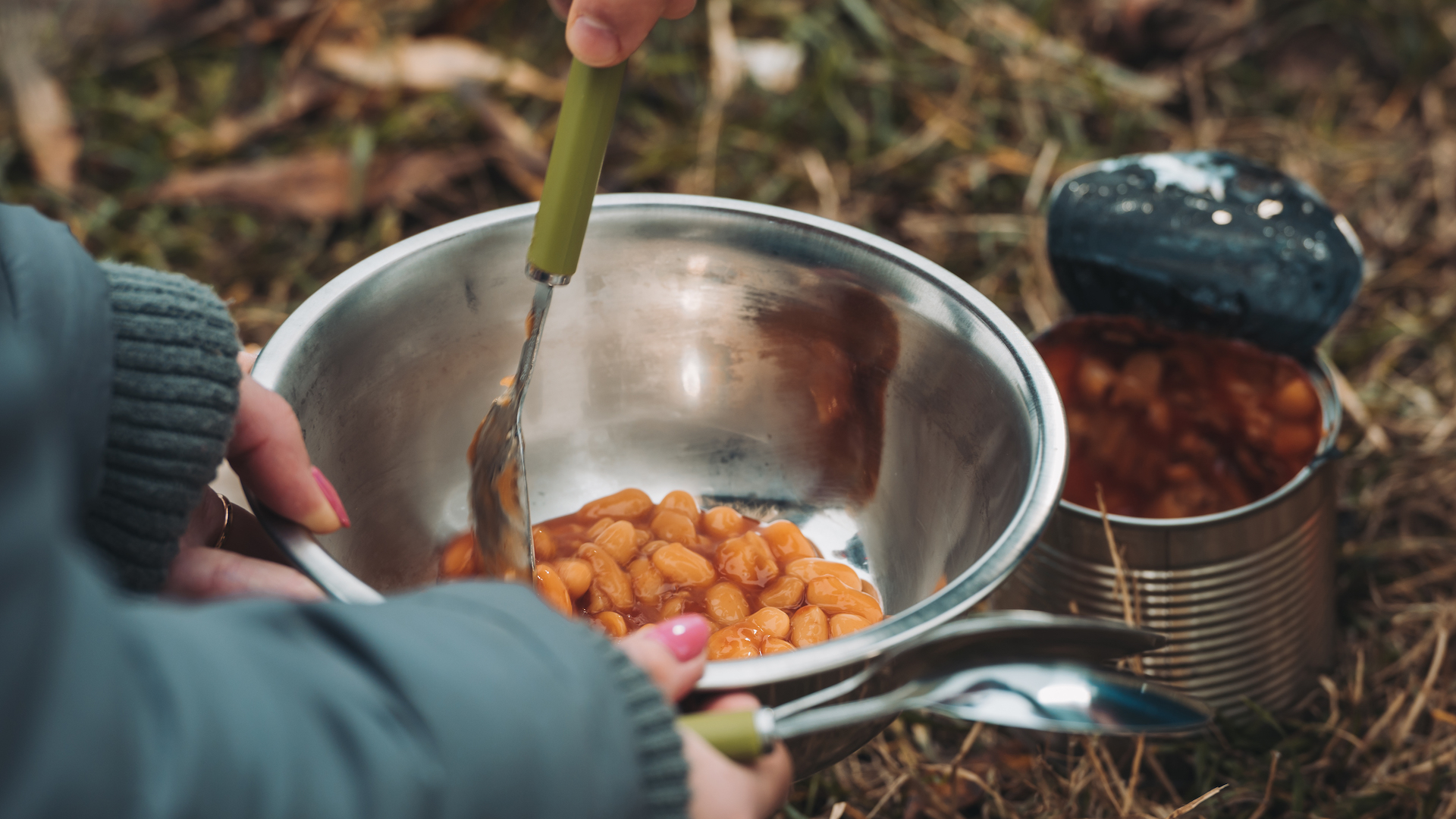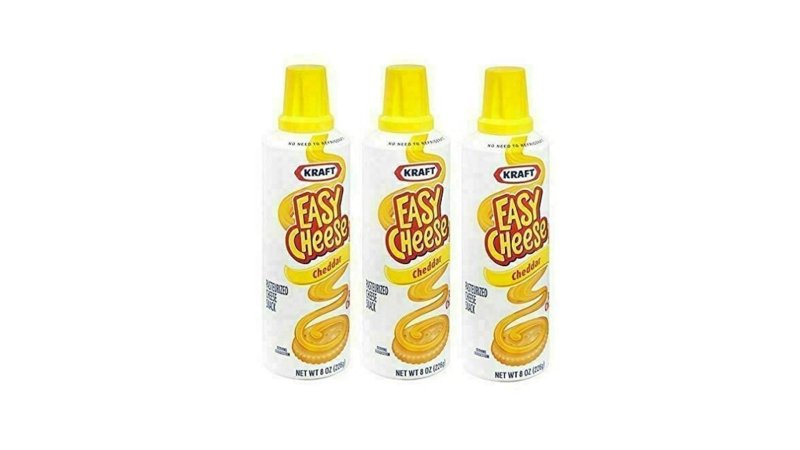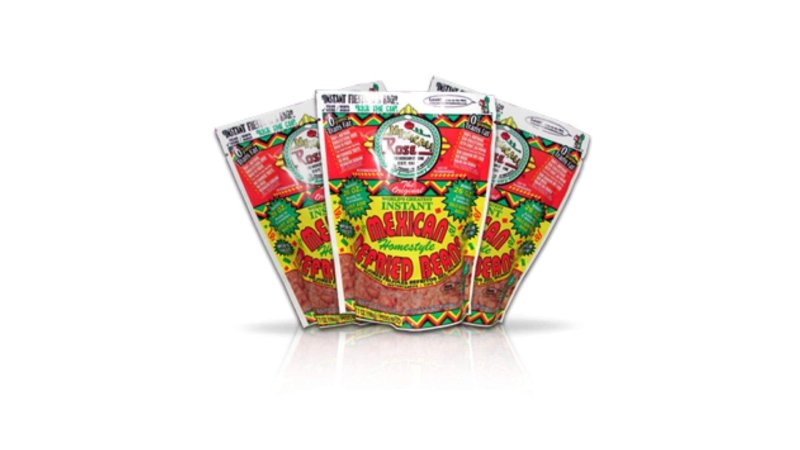

We may earn revenue from the products available on this page and participate in affiliate programs.
The best camping food will do more than fuel your body during backcountry adventures. It’ll be food that you actually want to eat. If you’ve seen the film Meru about mountaineers Conrad Anker, Jimmy Chin, and Renan Ozturk’s successful summit of the 21,000-foot mountain via the Shark’s Fin Route, you’d have noticed that their entire diet while on the wall seemed to consist of couscous, extra-large Snicker bars, parmesan cheese chunks, and cigarettes. While Anker and company made those decisions purely based on caloric intake and simplicity, you have more options — far more — to fuel your treks.
If you are car camping, have a decent cooler, camping stove, and weight and space are no concern, you can pretty much bring what you like to eat at home. If you are going to be carrying it all on your back, it’s best to go with dehydrated backpacking meals that you can heat and rehydrate when you get to your next camp. There are a ton of tasty options on the market, and I’ve researched some of the best for you to try. You’ll find all of these in my pack from time to time. Bon appetit!
Methodology
I’ve been an outdoorsman for more than 35 years. I’m an avid long-distance backpacker, rock climber, and mountaineer, so I understand the value of well-designed gear. I don’t get paid by the manufacturers and have editorial independence. My editor leaves it to me to recommend and prints what I write. All of this enables me to provide you, our valued readers, with our unvarnished, honest opinions on the recommendations we make.
All the foods in this review were selected based on personal consumption, interviewing other experts, and thoroughly reviewing manufacturers’ specifications. We take our time to get to know the strengths and weaknesses of each item and also check out the reviews of other experts just to make sure we’re not missing anything.
Best Overall
Good To-Go Thai Curry
Pros
- Very lightweight
- Great calories: weight ratio
- Easy to prepare
- Great taste
Cons
- Requires a stove to boil water
- Takes about 20 minutes to fully rehydrate
Product Specs
- Weight: 6.6 ounces
- Servings per container: 2
- Total calories: 770
- Total fat: 28 g (16g saturated, 0% trans)
- Sodium: 1010 mg
- Carbohydrates: 112 g
- Sugar: 16 g
Best Value
Maruchan Ramen Noodles
Pros
- Very lightweight
- OK calories: weight ratio
- Fast and easy to prepare
Cons
- Marginal taste, but improved with doctoring it up
- Requires a stove to boil water
Product Specs
- Weight: 3 ounces
- Servings per container: 2
- Total calories: 190
- Total fat: 7 g (3.5 g saturated, 0% trans)
- Sodium: 830 mg
- Carbohydrates: 26 g
- Sugar: 1 g
- Protein: 4 g
Editor’s Choice
Mountain House Beef Stroganoff with Noodles
Pros
- Very lightweight
- Good calories: weight ratio
- Fast and easy to prepare
- Great taste
Cons
- Requires a stove to boil water
Product Specs
- Weight: 4.3 ounces
- Servings per container: 2
- Total calories: 560
- Total fat: 23 g (7 g saturated, 0% trans)
- Sodium: 1570 mg
- Carbohydrates: 63 g
- Sugar: 8 g
- Protein: 24 g
Honorable Mention Dehydrated Meal
Backpacker’s Pantry Lasagna
Pros
- Very lightweight
- Good calories: weight ratio
- Fast and easy to prepare
- Great taste
Cons
- Requires a stove to boil water
Product Specs
- Weight: 7 ounces
- Servings per container: 2
- Total calories: 760
- Total fat: 9 g (5 g saturated, 0% trans)
- Sodium: 690 mg
- Carbohydrates: 55 g
- Sugar: 11 g
- Protein: 22 g
Best Sports Hydration Tabs
NUUN Sport Hydration Tablets
Pros
- Replenishes minerals the body needs before, during, and after workouts
- Taste great
- Come in water-resistant plastic tube
- Non-GMO Project verified
- Certified gluten-free, vegan, kosher and Informed-Sport certified
- Made in USA
Cons
- A bit heavy, but totally worth the weight
Product Specs
- Serving size: 1 tab per 16 ounces of water
- Servings per container: 10 servings per pack
- Calories: 15
- Calories from fat: 0
- Sodium: 300 mg
- Carbohydrates: 2 g
- Potassium: 150 mg
- Sugars: 1 g
- Weight: 2.25 ounces
Ingredients:
- Lemon Lime: Citric Acid, Dextrose, Sodium Carbonate, Potassium Bicarbonate, Sodium Bicarbonate, Natural Flavors, Beet Powder Color, Potassium Chloride, Rice Extract Blend, Magnesium Oxide, Calcium Carbonate, Stevia Leaf Extract, Avocado Oil, Malic Acid, Riboflavin (for color)
Best Jerky
Patagonia Provisions Spicy Buffalo Jerky
Pros
- Tastes great
- Lightweight
- 31 g of protein
Cons
- 31 g of protein
Product Specs
- Servings per container: 2
- Calories: 190
- Calories from fat: 3.5 g (1.5 g saturated)
- Sodium: 860 mg
- Carbohydrates: 7 g
- Potassium: 595 mg
- Sugars: 4 g
- Protein: 31 g
- Weight: 2.2 ounces
Best Shelf-Stable Cheese
Hickory Farms Smoked Cheddar Blend
Pros
- Tastes great
- Shelf-stable
- Good calorie to weight ratio
Cons
- Heavy
Specs
- Servings per container: 10
- Calories: 90
- Calories from fat: 63
- Sodium: 250 mg
- Carbohydrates: 1 g
- Sugars: 1 g
- Protein: 6 g
- Weight: 10 ounces
Best Coffee and Tea
Wildland Coffee (in a tea bag)
Pros
- Tastes good
- Lightweight
- Doesn’t need a coffee maker
Cons
- None
Specs
- Servings per container: 15, 45, or 90 per box
- Calories: 0
- Calories from fat: 0
- Sodium: 0 mg
- Carbohydrates: 0 g
- Sugars: 0 g
- Protein: 0 g
- Weight: .1 ounce per packet
- Caffeine: 160 mg per cup
Best Nut Butter
Justin’s Classic Almond Butter
Pros
- Tastes great
- Lightweight
- 6 g of protein
Cons
- Packets are not recyclable or biodegradable
Product Specs
- Servings per container: 1
- Calories: 220
- Calories from fat: 19 g (3 g saturated)
- Sodium: 10 mg
- Carbohydrates: 5 g
- Potassium: 190 mg
- Sugars: 4 g
- Protein: 6 g
- Weight: 1.15 ounces
Best Protein Bar
RXBAR Protein Bar
Pros
- Tastes great
- Lightweight
- Calorie-dense
Cons
- Wrappers are not recyclable or biodegradable
Product Specs
- Servings per container: 1
- Calories: 200
- Calories from fat: 7 g (1 g saturated)
- Sodium: 310 mg
- Carbohydrates: 25 g
- Sugars: 15 g
- Protein: 12 g
- Weight: 52 g
Best Fish in Foil Packet
StarKist Thai Chili Style Tuna Packets
Pros
- Tastes great
- Lightweight
- Calorie-dense
Cons
- Wrappers are not recyclable or biodegradable
Product Specs
- Servings per container: 1
- Calories: 90
- Calories from fat: 1 g (0 g saturated)
- Sodium: 430 mg
- Carbohydrates: 7 g
- Sugars: 4 g
- Protein: 14 g
- Weight: 2.6 ounces
Best Guilty Pleasure
Kraft Easy Cheese Cheddar Cheese
Pros
- Guilty pleasure
- Not as high in fat as I thought
- Almost 600 calories per can
Cons
- Heavy
- Doesn’t pack down well
Product Specs
- Servings per container: Seven 2-tablespoon servings
- Calories: 560 total
- Calories from fat: 6 g (1.5 g saturated)
- Sodium: 440 mg
- Carbohydrates: 3 g
- Sugars: 2 g
- Protein: 4 g
- Weight: 8 ounces
Best Trail Burritos
Mexicali Rose Instant Homestyle Refried Beans
Pros
- Makes great trail burritos
- Super lightweight
- Cooks fast
- Rehydrates fully
Cons
- Requires boiling water to make
Product Specs
- Servings per container: 3
- Calories: 381 total
- Calories from fat: 0 g (0 g saturated)
- Sodium: 280 mg
- Carbohydrates: 21 g
- Sugars: 1 g
- Protein: 6 g
- Weight: 7 ounces
Best Nuts and Seeds
The Peanut Shop of Williamsburg Hot Habanero Nuts
Pros
- Calorie-dense
- Tastes great
- Super packable
Cons
- Bulky if kept in tin (put them in a Ziploc so they pack better)
- Pricey
Product Specs
- Calories: 170 per 2-tablespoon serving
- Calories from fat: 14 g (2 g saturated)
- Sodium: 290 mg
- Carbohydrates: 7 g
- Sugars: 1 g
- Protein: 7 g
- Weight: 10.5 ounces
Features of the best camping food
When you’re on an outdoor adventure, you’re going to rely heavily on your body — you’re carrying everything with you, and you’ll need to responsibly manage your limited resources. Therefore, camping food should be lightweight, calorie-dense, shelf-stable, and require a short preparation time. There are three main qualities to look for in camping food.
- Lightweight and calorie-dense – When you have to carry everything you have on your back, look for foods with very high calorie to weight ratios.
- Shelf-stable – Unless you plan on carrying a refrigerator, camping food should be OK at room temperature. A good rule is if it’s not from the refrigerated section of the grocery store, it will probably survive in your pack on a hot day.
- Taste – You can have the lightest, calorie-dense, and shelf-stable food, but if you hate the way it tastes, you’ll be miserable. Take foods you’ll actually want to eat and experiment with others you haven’t tried in limited quantities. Good food is a real morale boost after a long day on the trail.
Types of camping food
- Meals made ahead of time – Meals you can cook and store in a cooler are better for car camping because weight isn’t an issue and you have access to cooking equipment like a camp stove and pots and pans to reheat them.
- Dehydrated meals – These are shelf-stable meals and many will last more than a few years if stored properly. Their advantage is that they contribute to lower pack carry weight, but they do require you to also take a stove, fuel, and pot to boil water in to rehydrate.
- Ready-to-eat foods – These are foods you can eat on the go like chicken or tuna packets, energy and meal bars, nuts, etc. There are a bajillion options, but what they all have in common is that they’re high in carbs and protein, so they’ll keep your body fueled and moving. My favorites are almond butter packets and Honey Stinger Waffles.
Benefits
- Fuels your body – When you work hard, you burn calories that need to be replaced. Food does that. N’uff said.
- Convenient – Backpacking foods should be simple to prepare using only a camp stove and limited utensils. Most of the time you’ll be cooking when you’re tired and often in the dark, so keep it simple.
- Morale – Comforting snacks or meals can be a superb morale booster at the end of the day, especially when it’s cold, wet, or both. Don’t neglect your planning on food. You’ll only make yourself miserable.
Pricing considerations for camping food
This is a tough one given all the different types of products. A simple rule to pay attention to: The more work done to the food by someone else in advance, the more it will cost.
Budget
You can find decent camping foods to assemble into a meal for under five dollars. They might require additional doctoring with other ingredients to be tasty, but it can be done.
Mid-range
I consider anything in the $4 to $7 range to be mid-range for a prepared meal.
Premium
Top-end backpacking meals often cost about $10 to $12 each, but they also tend to be simple to prepare and better tasting without needing to doctor them up.
FAQs on camping food
You’ve got questions, Task & Purpose has answers.
Q: What food should I bring camping?
A: Bring food that you’ll want to eat that’s also lightweight, shelf-stable, calorie-dense, and simple to prepare.
Q: How do I keep food cold while camping?
A: If you are car camping, bring a cooler with ice. You can use dry ice if you can find it, but be careful when handling it.
Q: How do I pack food for camping?
A: Whether car camping or backpacking, it’s important to have a system of organization so that you aren’t a walking yard sale. For car camping, this usually involves coolers and boxes. When backpacking, I organize my food by meal in Ziploc bags and label them with a sharpie marker. I then put all of my food into a dry bag that has a few external loops which enables it to double as my bear bag (when I hang it in a tree overnight).
Q: How do I prepare food for camping?
A: My favorite way is to boil water, pour it into a dehydrated meal bag, and chill. Simple and tasty.
Q: How do I keep food away from bears while camping?
A: If you have trees available, hang your food in a bear bag. If not, take along a bear canister.













